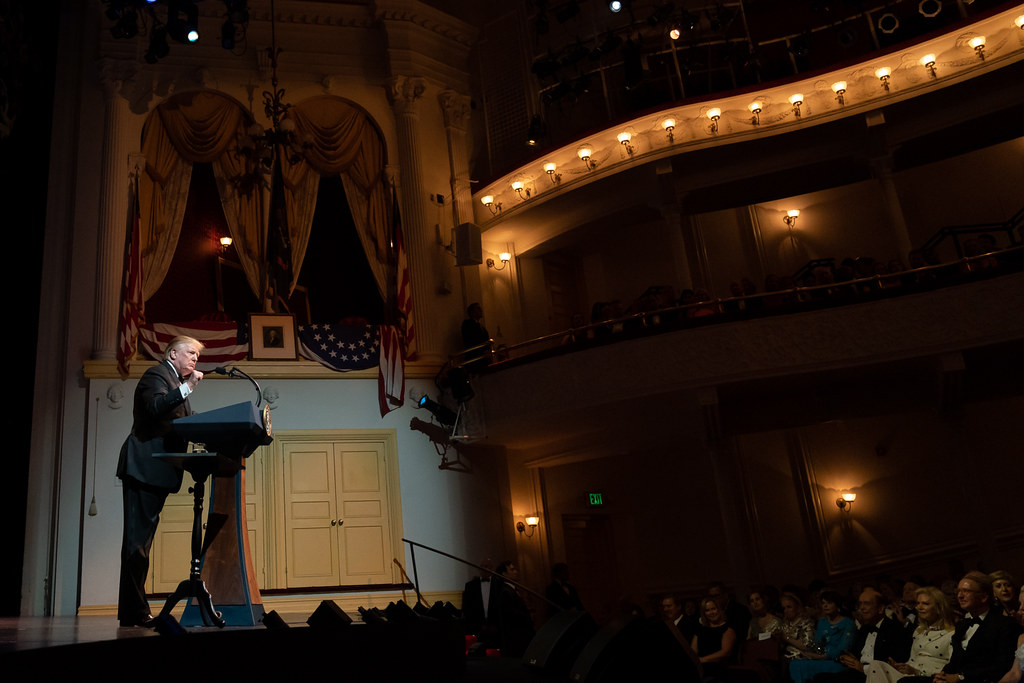The Mueller Report and the Limits of Theatrics
“[T]he work speaks for itself,” said Special Counsel Robert Mueller of his office’s report on election interference and potential obstruction of justice. On June 24, the organization Law Works agreed, producing a work of documentary theater drawn from the actual text from the Mueller report.

Published by The Lawfare Institute
in Cooperation With

“[T]he work speaks for itself,” said Special Counsel Robert Mueller of his office’s report on election interference and potential obstruction of justice. On June 24, the organization Law Works agreed, producing a work of documentary theater drawn from the actual text from the Mueller report. The play was written and compiled by Robert Schenkkan—known for his Pulitzer Prize-winning play “The Kentucky Circle” and his Tony Award-winning “All the Way.” It featured a star-studded cast including John Lithgow and Joel Grey, as well as Annette Bening, Kevin Kline and Justin Long. Over the course of an hour and fifteen minutes, the actors dramatized each of the 10 episodes that relate to obstruction of justice concerns, which Mueller described in Volume 2 of his report. For those interested, the full version is available below.
In about two weeks’ time, the country won’t need Lithgow or Grey or Bening to bring to life the words of the Mueller report: We’ll have Robert Mueller himself. The former special counsel has agreed to testify in a double-header hearing with the House Judiciary and Intelligence committees on Wednesday, July 17. It will undoubtedly be a piece of political theater—in preparation for which the strengths and weaknesses of the purely theatrical “The Investigation” may help to instruct committee members on how and how not to credibly conduct a Mueller hearing.
In developing the script for “The Investigation,” Schenkkan made the crucial choice to lift his text directly from the report, rather than shoehorn it into a more traditional script. Throughout the show, Kline narrates as a resolute Mueller, bringing the audience along through the 10 different acts. Bening interjects, announcing the turn from one act to another. In each, the actors present segments of the report pertaining to their characters—both direct quotations and descriptions of their actions. In a sense, they read both their character’s lines and stage directions. For example, Lithgow, as Donald Trump, follows one furious tirade against Jeff Sessions (played by Grey) with a more muted, “The President said that the recusal was unfair and that it was interfering with his ability to govern and undermining his authority with foreign leaders.” In response, Grey’s Sessions drawls, “Sessions responded that he had had no choice but to recuse, and it was a mandatory rather than discretionary decision.”
Here’s what works about the play: It brings the document to life. Even after reading the Mueller report, there are segments that seem almost unbelievable. For instance, on paper, it’s hard to buy that a president would lambast his attorney general for following basic legal ethics by saying, “This is terrible …. Jeff, you’ve left me on an island. I can’t do anything.” Yet, according to Mueller, this is exactly what Trump said to Sessions after Sessions followed the advice of career Justice Department ethics officials and recused himself from what would become the Mueller investigation. Watching Lithgow, face reddening, hurl that evocative accusation at Grey’s simpering Sessions, you believe it. And you’re horrified.
The drier parts of the report, too, work as theater. On the page, what seems to be a bureaucratic back-and-forth between then-White House Staff Secretary Rob Porter (played by Wilson Cruz) and then-White House Counsel Don McGahn (played by Michael Shannon) regarding a letter the president wants McGahn to write—which he ultimately refused to write—becomes a conversation about the unsaid, that the president wanted the White House lawyer to create what he believed to be a false record for investigators.
A nationally televised congressional hearing is inherently a performance, and here the actors of “The Investigation” can offer guidance. The majority of actors portrayed their characters with subtlety rather than melodrama or bombast. They aren’t wrapped in an epic battle to save democracy or an epic conspiracy theory to undermine it. They are simply people doing their jobs in bizarre circumstances. For instance, Shannon’s quietly frustrated McGahn helps emphasize the relentless nature of the president’s efforts to end or intervene in the Mueller probe and how often it was solely McGahn’s refusal to carry out orders that prevented the president from doing so. And Gina Gershon’s quiet-yet-gobsmacked Deputy National Security Adviser K.T. McFarland highlights just how odd it was for Trump to ask her to draft an internal record she did not believe to be accurate regarding National Security Adviser Michael Flynn’s communication with Russia. Ironically, these understated theatrical choices serve to highlight the more dramatic parts of Mueller’s narrative, because they allow the text to speak for itself.
There were two notable exceptions to this. Grey’s Sessions—an effeminate, bumbling southerner—and Alfre Woodard’s breathy, ditzy Hope Hicks elicited laughs from the audience, but telling the stories that involved those individuals in this cartoonish fashion actually undermined the credibility of the production. This was a particular shame in the case of Sessions, whose interactions with the president are so central to Mueller’s narrative.
It’s also hard to argue that Lithgow’s red-faced, emotive Donald Trump was understated. (Then again, Trump himself is a bit of a caricature; it’s actually hard to deliver lines like “this is the end of my presidency. I’m fucked” with tasteful understatement.) What’s more, Lithgow also made an unexpected choice: He made the character his own. Rather than delving into parody or impression, as Alec Baldwin has done on Saturday Night Live, he portrayed someone new: an obsessive, emotionally volatile man who delivers tirades against subordinates with almost Shakespearen elocution. While not subtle, this decision, too, lets the report speak for itself. It allows viewers to hear the words without the baggage they may attach to the president’s voice.
The show proceeds in this manner until the end, when it devolves into an excoriation of Attorney General William Barr and a recitation of the impeachment clause of the Constitution. The reading ends with Bening ominously decreeing: “Our forefathers fought a bloody war against a tyrannical king. When they framed the Constitution, they did so fully aware of the potential dangers of a powerful executive …. Robert Mueller did his job. The question is, will we do ours?”
The production had already made its point. The play’s creators should have listened to their own advice: Robert Mueller did his job of laying out instances in which the president’s conduct met the standards for obstruction—and when it didn’t. The sentimental, foot-stomping ending undid much of the credibility the production had built up over the previous hour, with its straight-shooting if emotive presentation of Mueller’s work in his own words. Whatever persuasive power the first hour of the production had went out the proverbial window with the decision to have the last word, not to let the report speak for itself.
So what can Congress learn from all of this? Asking deliberate, narrative-driven questions about the text of the report will tell a powerful and credible story. Sentiment, indignation and pontification will distract. And a four-hour presentation of the narrative Mueller and his team painstakingly constructed will be far more compelling than a four-hour presentation of what members of Congress feel about the Mueller report. Using this testimony as a moment to pontificate would be to squander what will likely be the only opportunity to hear Mueller outline his work in his own words.
Robert Mueller, whatever his skills may be as a prosecutor or FBI director, is no classically trained actor. If his public remarks on the report and his congressional testimony in his role as FBI director are any guides, Congress should expect an unemotional performance. He will be dry and, as he promised, will not go outside the bounds of the report. He will present the evidence, plain and simple. But because the evidence is quite compelling, members of Congress should embrace the opportunity to present that evidence, without taint of political dogma or high emotion. In short, they should work with the script and the leading man they’ve got.
“The Investigation” gave Congress a low-stakes dry run of presenting the Mueller report to the public. While a group of Hollywood A-listers can’t tell Congress much about what to ask Mueller when he sits down to testify on July 17, they can show members of Congress where to look in crafting their own questions and how to deliver those questions. To the question of where, the answer is the 448 pages Mueller has already written. As for how, the answer is with seriousness of purpose and without pretention or pontification. The hearing will be a spectacle—but it doesn’t have to be a circus.
And, for goodness’s sake, let Mueller have the last word.




